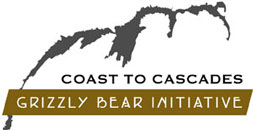Here it is...the next instalment of "A Night with Grizzlies' and this time we are in North Vancouver. Please join COASTtoCASCADES and guest speakers and spend an evening with the grizzly bears of southwest British Columbia at North Vancouver's Centennial Theatre on Tuesday May 12th.
Members of the public are invited to open houses on options for grizzly bear restoration in North Cascades ecosystem. Public comment period open through March 26, 2015.
The following is from a press release issued by the US Fish & Wildlife Service and the National Park Service on February 15th, 2015.
In a letter to PWA the BCWF highlighted: "A return to a healthy population of Grizzly Bears will also be a strong measure to indicate the health of that particular ecosystem. We believe that the reintroduction needs to be supported by habitat and population objectives for grizzly bears and other wildlife in the area".
2015 got off to a great start for grizzly bears with the Okanagan Nation Alliance (ONA) Chiefs passing a resolution calling for protection and recovery of grizzlies, known as kiʔlawnaʔ in the nsyilxcen language. Interestingly kiʔlawna is the root word for the town of Kelowna.
First Nations and scientists have long recognised that grizzly bears are barometers of wilderness and the health of ecosystems. They require large tracts of wild habitat with rich, diverse and seasonal foods like berries, roots and salmon. When grizzly bears are present, we know that these same healthy wild landscapes also provide our society clean water, robust forests and diverse wildlife. Coast to Cascades grizzly bears are an early warning system indicating how well we are stewarding natural systems for future generations.
When talking about grizzlies we often find that the topic of guns comes up. While there is no legal hunting in the five threatened populations focused on by COASTtoCASCADES, the greatest loss of bears is through them being shot. These shootings are either due to illegal poaching or instances of real or perceived human-bear conflict. So how to reduce the likelihood of human-bear conflict when in bear country? Well, we can adopt habits that will keep us safe, such as:





